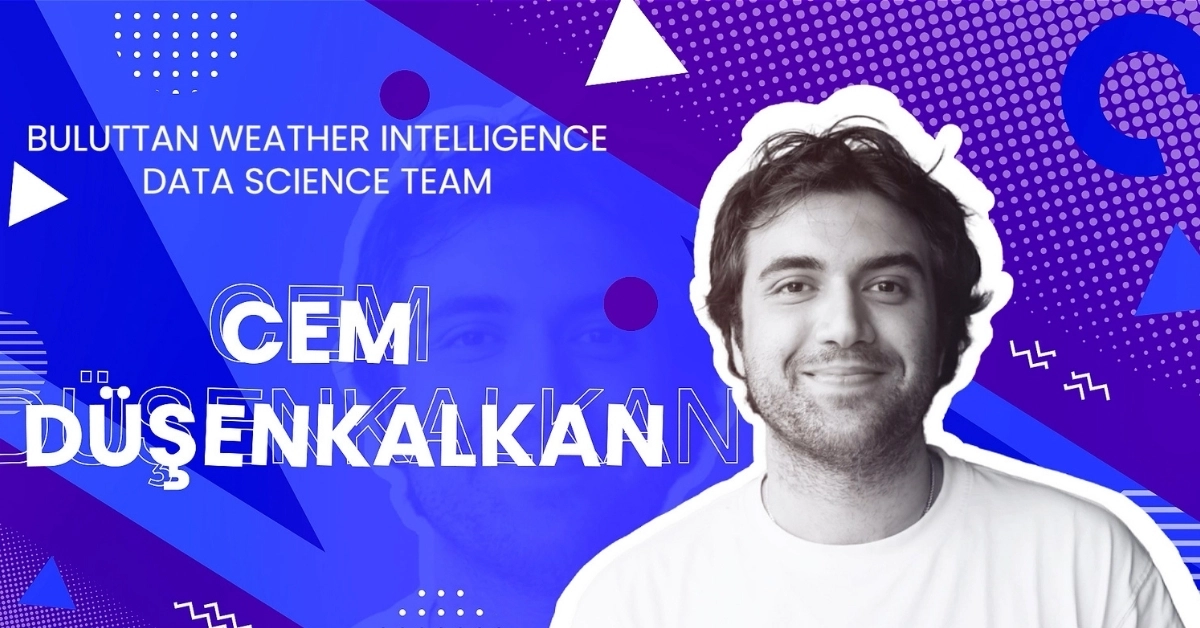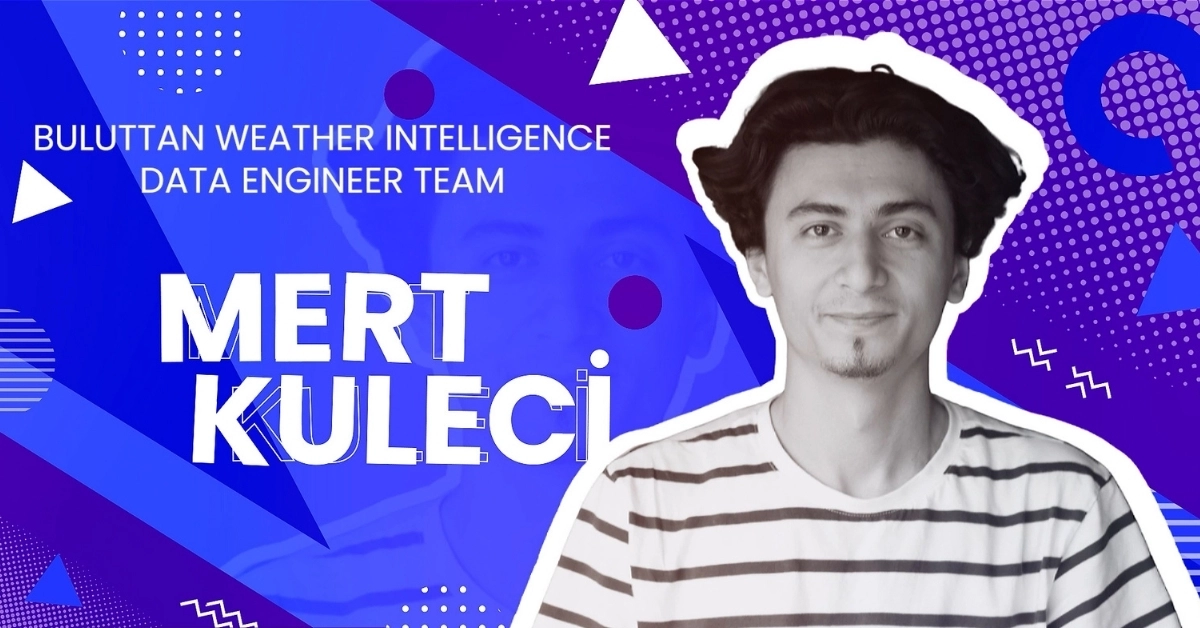In this episode of Buluttan Small Talks, we are with Arsalan. You can watch our video where Arsalan shares how he met Buluttan, what he does at Buluttan, his life in Turkey, and his comments on weather intelligence market.
Gökmen: This time we are gonna make it English we are gonna have a conversation with you it’s the first time we are doing it. So I’m excited as well and you are one of the earliest joiners in the team as a international team member if we exclude Turkish people in the team. So welcome.
Arsalan: Thank You, hoşbulduk.
Gökmen: Hoşbulduk. Arsalan we have been working for last two months almost, let’s say you know about Buluttan now to some extent and you know about the team, you know about the vision and the things that we are trying to accomplish here altogether. So let's start with how you coincide with Buluttan. Can you just briefly come up with the idea of joining the team, at least making a chance, first of all? And what did you expect, what did you find?
Arsalan: Yeah, I think initially how I came across Buluttan was through LinkedIn and I was looking mainly for startups tech companies in Istanbul that really have interesting data because there's a lot of traditional companies that have more, I guess, boring data. So I was looking hopefully to work with a company that has more challenging type of data. And when I came across Buluttan, I saw first of all how active the LinkedIn page is and it was really nice to see kind of that presence. And there was a lot to learn about Buluttan, whereas a lot of companies, you come across their page, it's really hard to understand what are they doing and what are they about. My first impression of Buluttan was that they're really active, they're really tech forward. When I see the word weather and intelligence, these are two words that really resonate with me. So that was kind of my initial impression. And then I saw that you're hiring for a position that I'm interested in and that was the first step I took. And then when I got the call, I was really excited to explore it.
Gökmen: Perfect. Likewise, I mean, we were excited by a couple of things by then. First thing is the time you were joining the team coincides with the first hiring, international hiring, including you. So we were transforming the company in a way that we will communicate in English, a challenge for the other startup as well. It's also coinciding with the paradigm that we are going extra mile in the team and in the business. So you just jumped in the right phase, let's say. What do you do currently? I mean, what are you working on? Feeling good, specifics? What's the thing that you spend most of your time?
Arsalan: Yeah, right now I've been helping the energy team, I guess, with preparing the data, transforming the data for their machine learning algorithms. That's always really exciting for me as someone in the background of data to really make sure that the data is as easy to use for the analysts, for the data scientists, for the meteorologists. So it's been really exciting to kind of dive into the wind energy industry. Understand how does wind speed impact this, the domain of it? I'm a little bit of a tech nerd and science nerd, so it really is interesting to me to learn about the specifics of the wind energy industry. And on the other hand, getting the data ready for them is also very satisfying because it can immediately see how they're using the data, how it's going back into the product that the clients are using.
Gökmen: Yeah, exactly. Especially it's not maybe valid for all sectors or all businesses, but seeing the impact of what you are dealing with is something else. If we exclude, let's say, Buluttan energy sector who's also like, what do you do except for being a tech nerd?
Arsalan: Let's say I think I have a nerdy side and a more artistic side, I guess, on my nerdy side, yeah, I like to read about history, geography, things like that. I like to watch a lot of YouTube videos, listen to podcasts. But aside from that, on the other aspect of things, I like cinema, I like to go to film festivals. I like to also see theater as well. In Istanbul, it's a little bit hard to find English ones, but I'm improving my Turkish, so I can enjoy Turkish art as well. But aside from that, I like to go art galleries, museums. Recently I've been doing more traveling as well, so it's been really fun.
Gökmen: Do you find it difficult to, let's say, get involved in life? A lot of people speaking only mother tounge language majority is not very aware of the importance of English speaking, let's say. So how do you find the Turkey? Because you just studied and worked in Canada, you just came over here, so how do you see it?
Arsalan: t's been a mix of pleasant experiences and frustrating experiences. I think it's pleasant because thankfully I understand better than I can speak. So a lot of times I understand things and I can just get by with “Evet”, “Tamam”, ”Teşekkürler”. But other times, when I need to really communicate something, especially moving here, sometimes to get something done around the apartment, you call someone, they come, it's hard to communicate with them. Thankfully, I've had my partner who speaks Turkish, so she saves me in that aspect. But other times it's definitely frustrating. But at the same time, it's a good challenge. It forces me to actually learn the language. If I went somewhere where everyone is accommodating for me, I would have less motivation to learn the language. And it's a language that's also close to my mother tongue Farsi. So it's easier to learn it than, let's say, someone that only speaks English. But it's a mix, a challenge and also rewarding.
Gökmen: How's your experience till now? I mean, it's been more than a month. How's your experience? I mean, what can you share for new joiners for international people who will probably join team who wonders, let's say, weather intelligence market because it's pretty new.
Arsalan: I think it's a two way challenge. So they are putting effort, they are accommodating for me by speaking English and it's also my responsibility to make them feel comfortable. If sometimes they want to speak Turkish to someone else or to me even, they can say it in Turkish and then I will either understand it or it helps them kind of gather their thoughts and then they can communicate it in English. Other times it's also making them feel comfortable so that even if they're not using the correct words or they don't have the confidence to say something, they can just say it with the words they know. And if I don't understand it, I will ask with follow up questions. If I do understand it, then it makes them feel comfortable that they can actually communicate. So it's definitely a two way street.
Gökmen: Last but not least, for sure, but I want to hear your comments to the extent you have experienced for sure. I want to hear your comments about weather intelligence market is because rom our perspective there has been a recent change, let's say startup change maybe by the help of developments in processing as well as increasing data points that we can collect as the observational sources data. If you combine these two more processing power, power with inexpensive sources, if you combine this capability with the increase in data endpoints, then it can lead you a paradigm shift in weather intelligence, which means physical models like methodological models, splits and statistical models on top of it, splits adds up 100% here. But the splits among these two will change in the near future and it's changing. The importance of the data that you collect and the importance of the processing power you have will be much more important than today in near future most probably,
Arsalan: Most probably.
Gökmen: So how do you say it? Is it something I mean considering the work that we conduct counseling the developments in weather intelligence, considering the improvements in the market, how do you say it in the near future?
Arsalan: I think just like every other industry that went through a data revolution and now it's the time for the more hard sciences like Meteorology, where you can bring in the technology, the tools that we've been using to optimize, let's say online shopping. We're using the same tools and same technology to now apply to something like Meteorology and bridging really the gap between the technical expertise and the science and engineering aspect of it. So I think it's time for it. And as we see, there aren't that many companies that are doing what we're doing because it's two different domains and they've been kind of separated from each other. Meteorologists might have found it too difficult to get more into the tech aspect of things and tech probably thought meteorology is too complicated for them. So really this is Buluttan is bridging those two universes together and as we see, weather impacts everything and can really help every type of industry to make better decisions, be more efficient, and ultimately help the planet too. So if they're more effective in how they're doing business, they're making a better impact on the world and less of a negative impact on the planet. So there are many, many different forces here. And I think that's what makes it really exciting is that it's a new field where you're bridging a gap and you don't get that opportunity often in the industry. If you caught the opportunity to work in the first age of tech companies, if you caught the age of aerospace that started using this. So every industry goes through that phase, but it's only one time that it gets that data revolution. And right now, meteorology is getting that data revolution. So it's really a now or never opportunity to get into this field if you're interested in kind of helping bridge that gap.
Gökmen: Perfect. So let's end the conversation from the new media room saying something in Turkish.
Arsalan: Bu uçak çok güzel, rengi çok güzel.







